 Petzlover
Petzlover Antebellum Bulldog is originated from United States but Dingo is originated from Australia. Antebellum Bulldog may grow 6 cm / 3 inches higher than Dingo. Antebellum Bulldog may weigh 36 kg / 80 pounds more than Dingo. Antebellum Bulldog may live 5 years less than Dingo. Both Antebellum Bulldog and Dingo has same litter size. Antebellum Bulldog requires Low Maintenance. But Dingo requires Moderate Maintenance
Antebellum Bulldog is originated from United States but Dingo is originated from Australia. Antebellum Bulldog may grow 6 cm / 3 inches higher than Dingo. Antebellum Bulldog may weigh 36 kg / 80 pounds more than Dingo. Antebellum Bulldog may live 5 years less than Dingo. Both Antebellum Bulldog and Dingo has same litter size. Antebellum Bulldog requires Low Maintenance. But Dingo requires Moderate Maintenance
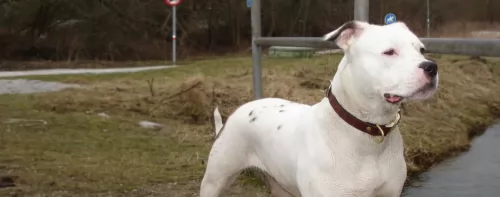 The history of the Antebellum Bulldog dates back the 1600s where it was used as a lasting solution to drive away hogs in rice plantation farms in Altamaha River in Georgia. After the plantation system became dominant in most parts of the United States, a majority of the farmers had to think of a more creative way of driving away wild feral pigs and cattle. Having caused multiple deaths to humans due to their massive bodies and extremely sharp horns, farm owners had no option but to employ bulldogs as the only means of security.
The history of the Antebellum Bulldog dates back the 1600s where it was used as a lasting solution to drive away hogs in rice plantation farms in Altamaha River in Georgia. After the plantation system became dominant in most parts of the United States, a majority of the farmers had to think of a more creative way of driving away wild feral pigs and cattle. Having caused multiple deaths to humans due to their massive bodies and extremely sharp horns, farm owners had no option but to employ bulldogs as the only means of security.
Although these dogs served their purpose of protecting their masters while still being family companions, their age of extinction came during the Civil War where the economy at the Altamaha region was permanently altered. After the fall of plantation farming and abolition of slavery, the Antebellum Bulldog became a forgotten breed something which led to its extinction. However, as years passed by, this rare breed was eventually reintroduced by the Maxwell family under strict guidelines by the Animal Research Foundation.
 The Dingo dog was in all probability, introduced to Australia thousands of years ago. He isn’t your usual domesticated dog and in fact it is a feral dog native to Australia.There are stories that suggest that while they may have once been pets, they were abandoned so that they reverted back to their wild state.
The Dingo dog was in all probability, introduced to Australia thousands of years ago. He isn’t your usual domesticated dog and in fact it is a feral dog native to Australia.There are stories that suggest that while they may have once been pets, they were abandoned so that they reverted back to their wild state.
They became pests for Australian farmers, going for their livestock, and huge fences were erected. The different climates in Australia have meant different kinds of Dingo developing, so while the desert ones are like the desert sands - golden yellow to red the alpine ones are rarer and are cream colored.
These wild canines were also introduced to Southeast Asia some 3,500 years ago, however the dog’s exact origin is debatable. There are any number of groups of people who could have brought the dingo to Australia, and among some of these are Indian mariners or maritime hunters.
The dog has been found in many parts of mainland Australia but never became established in Tasmania.There has also been an effort to remove the Dingo from farming areas. It is interesting to note that the first Dingo, referred to as the Australian dog, was registered at the London Zoo in 1828.
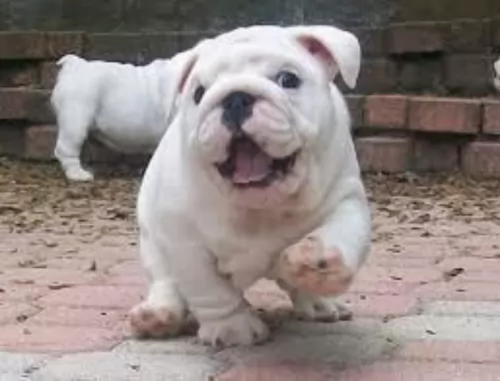 The Antebellum Bulldog is a recently introduced breed that was developed with an aim of recreating the historic working bulldog or Southern breed. First introduced in the United States, this bulldog was initially bred to be used as a working dog in rice plantations in Altamaha River Valley, a region in South East Georgia.
The Antebellum Bulldog is a recently introduced breed that was developed with an aim of recreating the historic working bulldog or Southern breed. First introduced in the United States, this bulldog was initially bred to be used as a working dog in rice plantations in Altamaha River Valley, a region in South East Georgia.
By nature, the Antebellum Bulldog is an extremely loving, loyal, affectionate, and very intelligent pet. Due to that reason, this breed is a perfect choice for a family dog. If we can get back to history, it’s evident that this dog breed was used in plantation farms to secure the rice from damages caused by cattle and wild hogs. Relating these tasks to the dog’s overall personality, you will find that indeed the Antebellum Bulldog is one such breed that can be trusted as a watchdog in today’s homes.
The Antebellum Bulldog is very similar to the American Bulldog only that it’s a little bit larger and bulkier with a proportionally bigger head. These breeds usually range from bigger to biggest with males weighing around 36 to 68 Kg (80—150 pounds) and females 32 to 50 Kg (70—110 pounds). Similar to the American Bulldog, the Antebellum Bulldog has a rough coat, long legs, an athletic body and short tail/ears that don’t require any cropping.
Despite of their intimidating appearance, the Antebellum Bulldog is an extremely loving, passionate, and loyal pet that will suit perfectly as a family dog. These dogs will lie down to their masters and will need nothing more than constant company. According to professional breeders, the Antebellum Bulldog is most likely to form a close attachment to one member of the family although they still do enjoy hanging out with the rest of the family members.
As it is the case with most American Bulldogs, the Antebellum Bulldog has a very strong protective instinct that makes it react violently when strangers step into its territories. Something else you need to know about this Bulldog breed is that it does get along well with kids to a point of being overprotective. Since puppies are usually over playful, adults are highly advised to watch out as they can accidentally bowl or knock over your toddler.
The Antebellum Bulldog doesn’t have to be professionally groomed as is the case with most dog breeds. Apart from a weekly brushing of the coat, the other grooming needs you’re supposed to observe include; regular brushing of the teeth and trimming of nails from an early stage.
 An interesting fact with these fascinating feral dogs, is that like humans, they’ve got rotating wrists. This characteristic of theirs allows them to use their paws much like the human hand to catch their prey. A domesticated Dingo can therefore learn how to open doors.
An interesting fact with these fascinating feral dogs, is that like humans, they’ve got rotating wrists. This characteristic of theirs allows them to use their paws much like the human hand to catch their prey. A domesticated Dingo can therefore learn how to open doors.
The Dingo is a medium sized dog standing at roughly 52 – 60cm in height, measuring up to 1.2 meters in length and weighing roughly between 23 to 32kg.
He has long canine teeth, a long muzzle, upright ears and a long, thick tail. The coat is essentially one color, sandy, white, cream, tan or black and sometimes there are white markings on the chest, the paws and around the muzzle.
The fur is typically shortish and thick — though the hair's thickness and length will depend on the climate of the area. The Dingo is a moderate shedder and a good brushing of the coat twice a week will keep the thick coat shiny and healthy.
These wild canines are social animals, and in the wild they live in packs. There are some that opt to live on their own.
They’e territorial, but they are able to share their living space with humans. They’re generally shy around humans, but a Dingo that is trained and socialized can get along well with children and pets in the home.
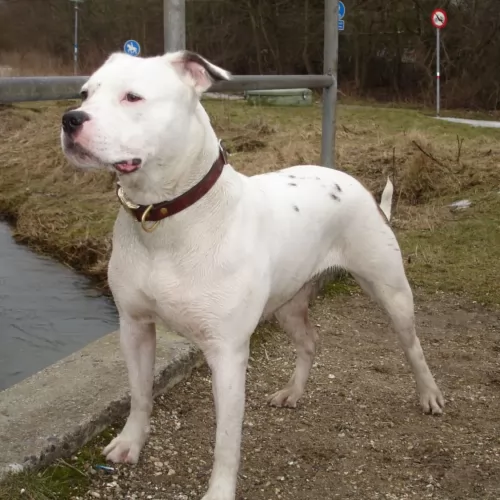 Although the Antebellum Bulldog is quite intimidating, this dog can make a great pet thanks to its loving, patient, and extremely tolerant characteristics. This dog enjoys playing with young children as well as other members of the family although proper care should be observed to avoid injuring young toddlers due to their muscular bodies.
Although the Antebellum Bulldog is quite intimidating, this dog can make a great pet thanks to its loving, patient, and extremely tolerant characteristics. This dog enjoys playing with young children as well as other members of the family although proper care should be observed to avoid injuring young toddlers due to their muscular bodies.
The Antebellum Bulldog is a protective dog breed with very strong guarding instincts. New visitors will have to be very careful as these dog breeds are quite wary of strangers and will not treat them politely. However, if you become familiar with them, they are likely to know you and later accept you as part of a large family.
Speaking of adaptability, the Antebellum Bulldog is more of a working dog than a household pet. Although some people will prefer to keep them indoors, always ensure that your homestead has a backyard where they can exercise. Otherwise, these dog breed will prefer to be kept in rural areas where there are vast tracks of land for them to play on.
Finally, the Antebellum Bulldog is an intelligent dog with a very sharp memory. However, due to their extremely playful nature, they can become very stubborn and messy. Therefore, owners are advised to train them early enough before they are fully grown.
 Dingoes have been domesticated successfully. Some people swear by them as making a fantastic pet. However, they’re wild dogs and can be unpredictable.
Dingoes have been domesticated successfully. Some people swear by them as making a fantastic pet. However, they’re wild dogs and can be unpredictable.
There are others who have tried to keep the Dingo as a pet but who have discarded them when they proved to be a danger in the home.
Dingoes can be trained but they’re high energy dogs and require a lot of exercise. How do you feel about owning a Dingo as a pet? Many people feel that its not fair to bring an essentially wild animal into your home. They feel that there are plenty of rescue dogs dying for a home without human beings searching in the wilds for an unusual pet, and regretting it later on.
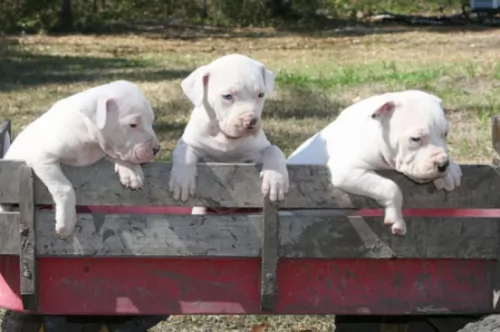 The Antebellum Bulldog has a life expectancy of 12—15 years. Recognized as an emerging breed, this dog doesn’t have many health problems as compared to most other dog breeds. Although these dogs are muscular and very athletic, these breeds suffer from various health conditions which are caused by the nature of their coat. Among the common health problems of the Antebellum Bulldog include
The Antebellum Bulldog has a life expectancy of 12—15 years. Recognized as an emerging breed, this dog doesn’t have many health problems as compared to most other dog breeds. Although these dogs are muscular and very athletic, these breeds suffer from various health conditions which are caused by the nature of their coat. Among the common health problems of the Antebellum Bulldog include
One major health problem that affects blue-eyed dog breeds (such as this one) is possible blindness. This condition is usually caused by diabetes, hypertension or Cushing’s syndrome. To treat this condition, you need to take your dog for regular veterinary checkups to know the root cause of the problem.
Another health problem that is very familiar with most Antebellum Bulldogs is hip dysplasia. Since these dog breeds are usually muscular and very huge, this condition is most likely to affect them, especially at an early stage. Dog owners should, therefore, be very familiar with this condition and should take their pets for regular veterinary tests to avoid it.
 The Dingo is a long-lived dog and you can expect your Dingo to live till anything between 15 and 20 years.
The Dingo is a long-lived dog and you can expect your Dingo to live till anything between 15 and 20 years.
When it comes to health issues, they are robust and resilient, having less medical problems to contend with than your regular dog.
However if you see that your Dingo is not his usual robust, energetic self, get him to the vet as soon as you can.
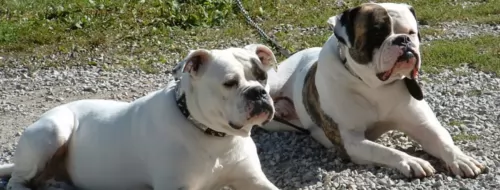 Feeding an Antebellum Bulldog is much similar to feeding other dogs. Owners are highly advised to stick to high-quality hypoallergenic diets that are rich in vitamins and nutrients. Now, since Antebellum Bulldog puppies are usually playful, feeding them with high nutrient food thrice a day will really help. Always avoid feeding your puppies with processed foods or foods with artificial sugars as they can expose the puppies to severe health problems.
Feeding an Antebellum Bulldog is much similar to feeding other dogs. Owners are highly advised to stick to high-quality hypoallergenic diets that are rich in vitamins and nutrients. Now, since Antebellum Bulldog puppies are usually playful, feeding them with high nutrient food thrice a day will really help. Always avoid feeding your puppies with processed foods or foods with artificial sugars as they can expose the puppies to severe health problems.
When feeding senior Antebellum Bulldog, there are some small changes you’ll need to make. First, these dogs will require high-quality foods that are easy to digest. Wet foods are perfect for Antebellum Bulldogs as they will help to keep them hydrated. Buy dog foods low in calories and rich in essential vitamins and nutrients to match your dog’s energy.
Antebellum Bulldog can add extra weight if proper care is not observed when feeding them. Due to this reason, these dogs should be fed depending on their level of activity to avoid cases of obesity.
Since their ancestors were used to guard rice plantations in Altamaha, Antebellum Bulldogs are very energetic and highly suited in rural settings over indoor lifestyle. However, if you decide to keep these dogs as pets in your households, it’s advisable that you provide them with some playing space in the backyard.
When it comes to training the Antebellum Bulldog, owners are advised to train them to be obedient at an early stage as they can get really stubborn in the future. These dogs are very intelligent and they never forget what they learn once they’ve mastered it.
 Caring for your Dingo will be different to caring for your usual pet dog. You have to remember the Dingo is an ancient, wild species with some unique characteristics. Having a Dingo as a pet and companion may not be an easy task, and it is why many people selfishly dump their Dingoes – they didn’t quite live up to what they had in mind.
Caring for your Dingo will be different to caring for your usual pet dog. You have to remember the Dingo is an ancient, wild species with some unique characteristics. Having a Dingo as a pet and companion may not be an easy task, and it is why many people selfishly dump their Dingoes – they didn’t quite live up to what they had in mind.
Your Dingo, just like any other dog you’d have, will require training and socialization, and the earlier the better. No training will simply mean you having an unruly pet in the home.
Your Dingo can be fed just like you would with your other dogs. You can feed him quality dog kibble as his main diet, but you can also add in cooked rice, vegetables and chicken. Your Dingo is essentially a wild dog, so you will definitely want to include some raw meat into his diet from time to time as well.
A Dingo is used to running free so he will require plenty of outdoor exercise. He can also be put on a leash and taken for a walk. He’ll love joining you in your activities such as running alongside you as you jog or cycle. He can adapt to life in the city if he is well exercised but he isn’t suited to a small home or garden.